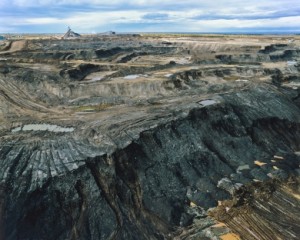Worldlog week 42 – 2013
Finally, measures are taken to curb the import of highly polluting tar sand oil! Our government will have to advocate in Brussels for a European import ban.
We have been pressing for measures against this fuel for some time as its extraction entails large-scale nature destruction and land grabbing. Tar sand oil mainly comes from Canada and is a severe attack on the ecosystems there. To be able to dig up the tar sands, forests are cut down and water and soil get polluted on a large scale.
In addition, due to its high CO2 emissions, tar sand oil is even more damaging to the climate than other fuels. On top of that, the oil extraction is destroying the habitats of native First Nations communities. People are expelled from their land and the heavy metals and chemicals that are everywhere in their food make them ill. This pollution causes an extremely high number of cancer cases among the local population.
Every year, the Dutch newspaper Trouw publishes a “Sustainable Top 100” of the most influential Dutch people in the area of sustainability. We are the only full parliamentary group of the Lower House listed! I was listed as no. 18 because of our successful fight against the selling of nature by nature organisation Staatsbosbeheer (Dutch National Forest Service). Through a ‘forest funding campaign’ last April, one quarter of a million Euros was raised through our website in two weeks’ time to buy the most vulnerable nature. Staatsbosbeheer needs to cut back and they want to do so by selling several pieces of nature in the Netherlands to the highest bidder. But the highest bidder could also be someone who would change the nature into something completely different. During the action we managed to buy almost 100,000 m2 of nature! The selling of more nature areas was fortunately suspended for now.
My colleague Esther was listed in the Top 100 by Trouw because of her fight against the illegal dumping of fish and because she made the ‘life of pesticides manufacturers difficult’. We will of course continue our fight against all ill-fated plans that will further endanger our planet earth.
Today (Monday the 14th of October), I will have a follow-up meeting with the ambassador of Romania about the new Romanian law that makes it possible to catch stray dogs at random, or to kill them by poison, hit them to death, or starve them in shelters. The Romanian Constitutional Court ruled in favour of the law on the 25th of September last. But this Romanian law ignores a number of European agreements. I also met the ambassador on the 20th of September last. The minutes of what was discussed on the 20th can be found in my Worldlog of week 39. Next week I will tell you more about the second meeting.
500.000 hectares of nature on the beautiful Aru Islands (near Indonesia) is threatened to be swallowed by sugar cane plantations of multinationals. Help and support the protest of the local population.
To finish off with, here is the wonderful statement of the world famous ecologist Rachel Carson: “We cannot have peace among men whose hearts find delight in killing any living creature.”
Greetings, Marianne
